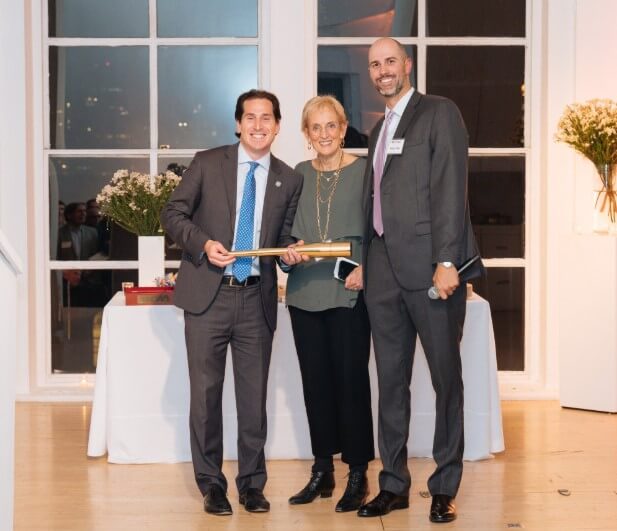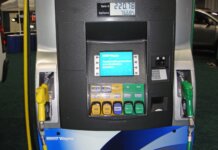At its annual awards reception in Manhattan, N.Y., earlier this month, Energy Vision – a national nonprofit that promotes low-carbon energy and transportation fuels – honored government and business leaders for accelerating the adoption of renewable natural gas (RNG).
The 2019 Energy Vision awardees include as follows:
- State Sen. Todd Kaminsky, D-N.Y., chair of the New York State Senate Environmental Conservation Committee;
- Juan Corcino, director of fleet operations for Manhattan Beer Distributors (MBD), which operates the largest private fleet of natural gas vehicles in the New York metro region and is working on fueling them with RNG; and
- Rudi Roeslein, founder and CEO of Roeslein Alternative Energy, which is pursuing a vision of leveraging RNG production from farm waste to help restore 30 million acres of prairie land.
“RNG is a decarbonization strategy that’s ready to go today, and we’re ready to make it go,” says Joanna Underwood, founder of Energy Vision. “There is enough organic waste in the U.S. to fuel every bus and truck fleet in every city in this country. New York City and New York State made extraordinary advances in adopting RNG this year. The MTA is converting 800 of its buses to use of RNG fuel. We celebrated the opening of the first RNG-only refueling station in New York City’s South Bronx. And the New York State legislature enacted a groundbreaking climate bill.”
Kaminsky was the lead sponsor of the Climate Leadership and Community Protection Act, enacted this year. The bill, which sets goals for New York to reach net-zero greenhouse-gas (GHG) emissions by 2050, aims to accelerate projects to cut GHGs, including building anaerobic digesters to make RNG for in-state use. Kaminsky also framed the Food Redistribution and Recycling Act, mandating New York supermarkets, restaurants and other businesses that generate food waste above a certain volume to collect it and send it to anaerobic digesters to be made into RNG. The program was incorporated into the 2019 state budget and will be implemented over the next two to three years.
New York-based MBD, the largest single-market beer distributor in the U.S., is converting its fleet to natural gas trucks that can run on RNG, improving air quality in New York City, Long Island and the Hudson Valley.
“I have three children – two born with asthma – and thank God they are doing well now,” said MBD’s Juan Corcino, who has worked for almost two decades to convert MBD’s diesel fleet to CNG to improve air quality.
“This project was originally MDB founder Michael Bergson’s idea,” Corcino said. “I took it on in 2001, when I was 22. I made a presentation to the finance department and argued that if we do this, we will get paid back by the difference between diesel and natural gas prices. Back then, nobody was using CNG to fuel truck fleets, and the few who did dropped it after a year, as soon as diesel prices went down. In those days, you had to have your own refueling station and had to pay $70,000 or $80,000 more for a CNG truck. Now, it’s simpler; many manufacturers offer CNG vehicles. You just call and order them. By June 2020, 75 percent of our fleet will be CNG, and we’ll eliminate 1 million gallons of diesel fuel per year. Our goal is absolutely 100 percent of the fleet. And we are looking forward to running it on RNG.”
Meanwhile, other major cities and companies are converting their vehicle fleets to RNG, including past Energy Vision award winner UPS, which just announced it will procure another 6,000 natural gas trucks. In addition, utilities such as SoCalGas and CenterPoint Energy are working to offer RNG to their customers. And major new farm anaerobic digester projects have come online, including for Smithfield Foods, which now makes RNG from hog manure in Missouri and North Carolina. By 2021, all Smithfield Foods facilities will produce RNG from their manure.
Roeslein Alternative Energy, another Energy Vision 2019 awardee and Smithfield Foods’ partner in RNG production, is led by Rudi Roeslein, who has financed and built five farm digester RNG projects in Missouri, with more on the way. They are part of Roeslein’s larger “30/30 Vision” to restore 30 million acres of marginal and highly erodible lands to native prairie grasses in just 30 years.
Ultimately, Roeslein plans to create RNG from the anaerobic digestion of animal manure, cover crops and prairie plants. The strategy reduces GHG emissions, conserves soil and stops environmentally damaging farm effluents from getting into waterways – all while generating renewable energy and an additional income stream for farmers.
“It often doesn’t pay to take a big risk when you work for a corporation,” Roeslein said, “but the people at Smithfield took a big risk. Together, we have built projects that produce enough RNG to displace tens of millions of gallons of diesel fuel per year. I initially put in $50 million of my own money to prove to Smithfield that this investment won’t cost them money, but will save money. We need to convince our government of this, too.”







